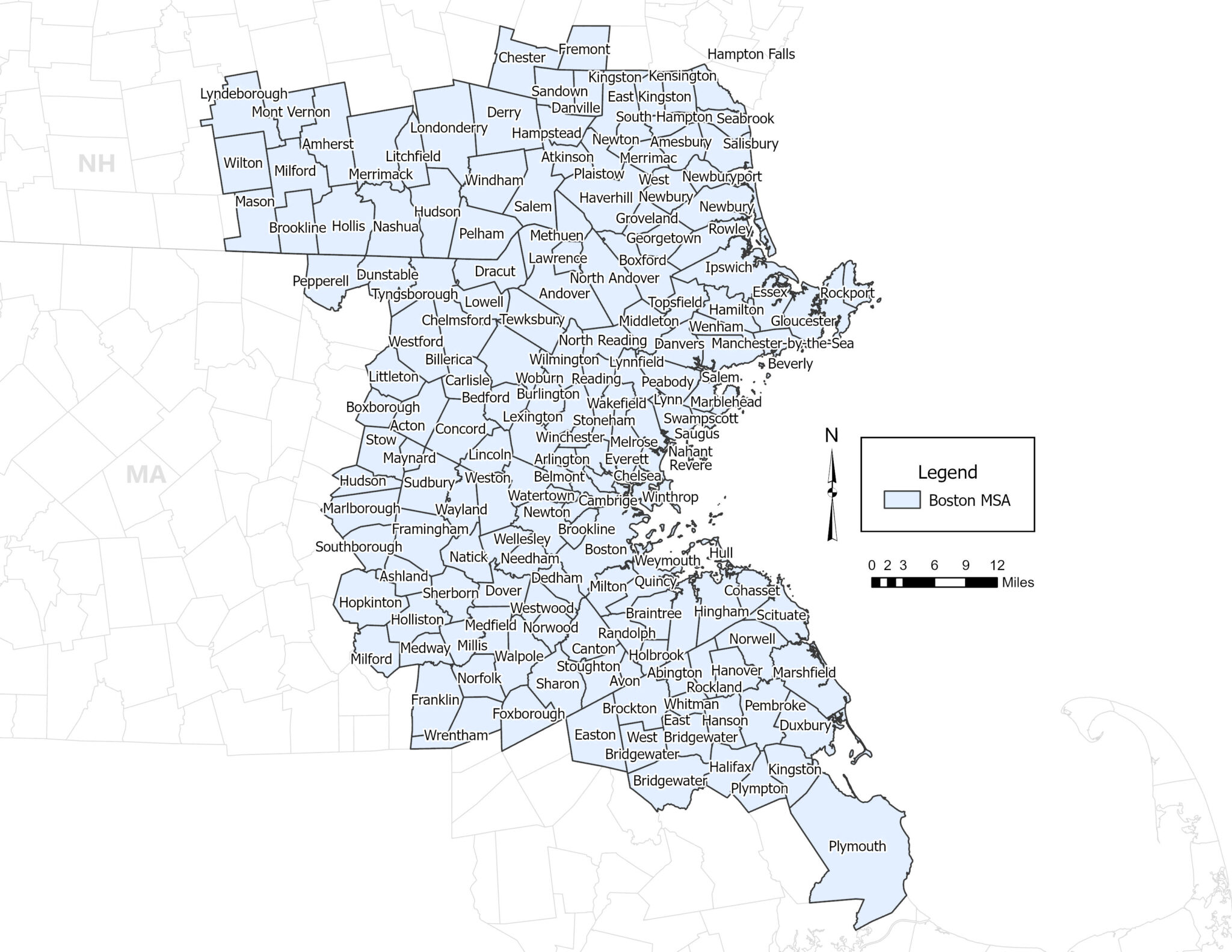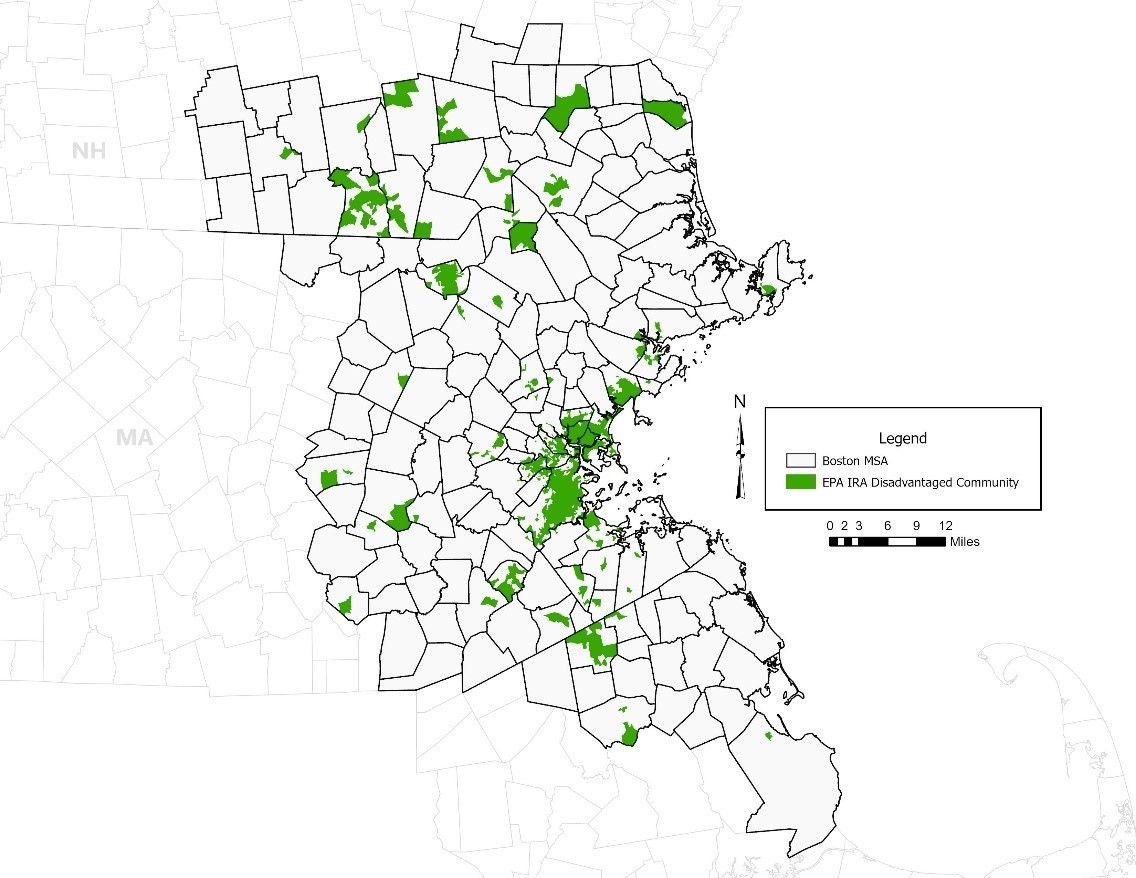Greater Boston Climate Action Plan
An Effort Funded by the EPA’s Climate Pollution Reduction Grant (CPRG)
The Metropolitan Area Planning Council (MAPC) and partners are developing a region-wide Climate Action Plan (CAP) under the U.S. Environmental Protection Agency (EPA)’s Climate Pollution Reduction Grant (CPRG) program. Additional support for the plan is provided my the Massachusetts Department of Energy Resources (DOER) and the Barr Foundation.
The regional plan encompasses 167 communities within Metro Boston, including parts of southern New Hampshire, and centers the priorities and ideas of Massachusetts’ Environmental Justice communities and federally designated Justice40 communities.
MAPC received financial support from the EPA for this project under an Assistance Agreement.

Latest Updates and Upcoming Events
Updates
MAPC Releases Priority Climate Action Plan
Read the blog post overview of the near-term Climate Action Plan.
Upcoming Events
No additional events planned for the remainder of 2024. However, stay tuned for 2025 events!
About the Greater Boston Climate Action Plan (GBCAP)
Partners across the Metro Boston region are working together to develop a regional roadmap to rapidly drive down greenhouse gas (GHG) emissions, slow the impacts of climate change, and realize near-term community benefits. Benefits of reducing carbon pollution across multiple sectors include:
- Improvements to air quality and public health;
- Increase of local, clean energy jobs;
- Reduction and stabilization of energy costs; and
- Improvements to public transportation and walkability.
This multi-year planning process includes three phases of work 1) Priority Climate Action Plan (PCAP) that establishes a near-term plan for action by 2030, 2) Comprehensive Climate Action Plan (CCAP) that covers a broader range of sectors, and 3) a Status Report in 2027 on progress made towards implementation.
In March 2024, MAPC submitted the Priority Climate Action Plan (PCAP) to the EPA. The PCAP is Greater Boston’s near-term plan to address the urgent challenge of climate change by rapidly driving down greenhouse gas (GHG) emissions. The PCAP includes:
- A region-wide GHG Inventory.
- Eleven Priority GHG Reduction Measures across the Buildings, Transportation, Electricity Generation, and Waste sectors.
- An analysis of benefits to low-income and disadvantaged communities (LIDAC).
We are currently working on the comprehensive Greater Boston Climate Action Plan (GBCAP) which will be completed by December 2025. This plan will include:
- An updated regional GHG inventory for 2022 and reduction targets for 2030 and 2050
- Additional GHG emissions reduction measures including those in the Agriculture and Natural Lands and the Industry and Manufacturing sectors.
- A regional workforce development analysis
Over the year, MAPC and partners will host a variety of opportunities for stakeholders to provide meaningful input and feedback on measures and analysis included in the plan.
The EPA is also providing funding to the State of Massachusetts and State of New Hampshire to develop state-wide climate action plans on similar timelines. We will coordinate closely with state entities and neighboring metro-regions on these efforts.
What is a Metropolitan Statistical Area?
A Metropolitan Statistical Area, or MSA, is a federal government designation of a regional geography with a dense population center and characterized by strong social and economic ties throughout the region.
The Boston MSA is comprised of 167 municipalities and represents 4.7 million residents across Eastern Massachusetts and parts of Southern New Hampshire.
Regional climate planning enables collaborative problem solving to address shared challenges and improve regional infrastructure.

Justice40 and Environmental Justice
The Commonwealth of Massachusetts defines Environmental Justice as “the principle that all people have a right to be protected from environmental hazards and to live in and enjoy a clean and healthful environment. Environmental justice is the equal protection and meaningful involvement of all people with respect to development, implementation, and enforcement of environmental laws, regulations, and policies and the equitable distribution of environmental benefits”. In Massachusetts, Environmental Justice Communities are designated based on a neighborhood’s 1) household median income, 2) percentage of residents who are racial minorities, and 3) percentage of households who experience English language isolation.
In 2021, the federal government made a commitment that 40% of the overall benefits of federal investment flow to socio-economically disadvantaged communities that are also overburdened by environmental pollution. These federally designated communities are known as “Justice40” and have some overlap with Massachusetts’s EJ Community designation. As a Federally funded project, our regional Climate Action Plan aims to center and prioritize Justice40 and EJ communities within the planning process, development of GHG reduction strategies, and future implementation of the plan.
In addition to establishing a Justice40 Advisory group to help guide the development of the PCAP and CCAP, the project team will assess each proposed GHG reduction strategy based on the benefits to low-income and disadvantaged communities (LIDAC).
Federally Designated Disadvantaged Communities

Ways to Get Involved
- Get regular updates and the Metro Boston Regional Climate Action Plan Newsletter by subscribing to the project's email list.
Subscribe Now! - Contact us at [email protected] for more information, if you have questions, and/or to get involved in the region's Climate Action Plan.
Committees and Advisory Groups
MAPC is collaborating closely with partners across the region to develop the plan.
Regional Planning Agency (RPA) Steering Committee: Comprised of the regional planning agencies/commissions within the MSA, this committee will help guide the planning process and lead stakeholder engagement activities within each RPA region. Members include: Old Colony Planning Council (OCPC), Merrimack Valley Planning Commission (MVPC), Northern Middlesex Council of Governments (NMCOG), Southern New Hampshire Planning Commission (SNPC), Rockingham Planning Commission (RPC), and Nashua Regional Planning Commission (NRPC).
Municipal Advisory Group: Comprised of 29 municipal staff and representatives, this group provides key input and feedback during key milestones of the PCAP and CCAP. Members include: Acton, Arlington, Ashland, Boston*, Bridgewater, Brockton*, Cambridge, Chelsea*, Concord, Framingham, Gloucester*, Hudson, Lexington, Lawrence*, Lowell*, Melrose, Methuen*, Natick, Newbury, North Andover, Norwood, Plymouth, Reading, Revere*, Salem*, Weston, Winchester, MA, Derry and Nashua*, NH.
* Denotes designated Justice40 community.
Justice40 Advisory Group: Comprised of 25 community-based organizations and non-profits, this group provides key input and feedback during key milestones of the PCAP and CCAP. Members include: Action for Boston Community Development, Inc., Action, Inc., All In Energy, Asian Community Development Corporation, Authentic Caribbean Foundation, Cambodian Mutual Assistance Association, Citizens Inn, Conservation Law Foundation, Boston Climate Action Network, Emerald Cities Collaborative, Granite State Organizing Project, Groundwork Somerville, Grow Nashua, Healthcare without Harm, Massachusetts Immigrant and Refugee Advocacy Coalition, Merrimack River Watershed Council, Neighborhood of Affordable Housing, Inc., New England United 4 Justice, Quincy Asian Resources, Roxbury Community College Foundation, The Latino Support Network, Town Green, Transit Matters, and Voices of the Community, and one Indigenous Land and Water Conservationist and Environmental Activist.
Past Events
Waste and Materials Management Workshop | November 18, 2024
MAPC hosted an interactive, virtual workshop to talk with stakeholders about reducing GHG emissions from Waste and Materials Management sector.
This event included remarks from State Representative Michelle Ciccolo and Department of Environmental Protection (MA DEP) Kathi Mirza.
Waste and Materials Workshop | October 24, 2024
MAPC hosted an interactive, in-person workshop to talk with stakeholders about reducing GHG emissions from Waste and Materials Management sector.
This event included remarks from State Representative Michelle Ciccolo, Lexington’s Sustainability Committee Chair Cindy Arens, and Department of Environmental Protection (MA DEP) Kathi Mirza.
Presentation Slides
Planning for a Circular Economy Presentation Slides - Representative Ciccolo
Lexington's Zero Waste Journey Presentation Slides - Cindy Arens
Reducing Waste in MA: MassDEP Programs, Policies, and Initiatives Presentation Slides - Kathi Mirza
Agriculture and Natural Lands Workshop | October 23, 2024
MAPC hosted an interactive, virtual workshop to talk with stakeholders about reducing GHG emissions from Agricultural and Natural Lands sector.
Greater Boston Climate Action Plan Listening Session | January 24 and 25, 2024
MAPC hosted two virtual listening sessions on the Priority Climate Action Plan. During these meetings participants provided input on the top GHG reduction measures included in the plan.
Greater Boston Climate Action Plan Listening Session | November 14, 2023
MAPC hosted the first listening session on the Greater Boston Climate Action Plan, funded by EPA Climate Pollution Reduction Grant. The session included an overview of the planning process and small break-out rooms for discussion.
